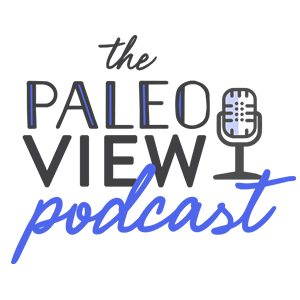On this episode of The Paleo View, Stacy and Sarah discuss some of the common concerns for those who are new to Paleo, dispel common Paleo myths, and help troubleshoot listener questions.
Click here to be taken to iTunes
or download and listen by clicking the PodBean Player below
![]()
If you enjoy the show, please review it in iTunes!
The Paleo View (TPV), Episode 163, Common Concerns for Paleo Newbies
- Intro (0:00)
- News and Views (0:56)
- Stacy’s hair is long enough to now put up into a clip, and her and Sarah discussed the excitement over her hair not falling out in chunks anymore from thyroid issues
- Sarah’s love of the convenience of unwashed longer hair for thrown up styles
- The impact of truly non-toxic beauty products and how great it is for your health when you are at the point where you make the switch with your products
- How Sarah’s transition into Paleo was impacted by making the beauty product switch to non-toxic items
- Sarah’s holistic approach and wanting to make everything she does as good for her health as possible – dialing into all the little components, without stressing about the things she can’t change
- Matt and Stacy’s approach and how they prioritize their health journey choices
- When Stacy and Sarah buy organic and when they buy conventional
- Don’t let perfection be the enemy of good, do your best
- Diana’s talk from the 2014 Ancestral Health Symposium on ethically sourced foods
- A bit on the process of raising conventional meat and what all could benefit from improving the system
- How buying local, sustainable, ethical foods helps the food industry evolve – using your dollar to vote
- The major chain stores that are making big changes to support the real food movement
- Organic/grass-fed does not go hand-in-hand with what is or isn’t Paleo, food can be Paleo if it is not organic
- Paleo was initially a set of rules, where as now it feels more like a template, which makes it more accessible and allows for self-experimentation
- Some of the biggest changes Stacy and Sarah have seen in the Paleo movement from when they first began
- It is all about making the cutoff on what super nutrient dense foods are you going to embrace, versus the potential problematic foods you are going to eliminate
- The lines between the various food-belief movements are starting to soften because we are all actually getting into contemporary science to better understand what exactly is happening that makes these foods good choices
- Questions & Answers (36:25)
- Lori – can you share a bit more on the gluten cross reactivity of white rice?
- Stacy wants to remind Lori that there are many ways to incorporate carbs beyond rice, like carrots, butternut squash, yuca, taro, and cassava flour
- Merit+Fork has some AIP friendly recipes that you could use, like her banana bread recipe or her chocolate chip cookies, just omit the chocolate chips
- What gluten cross reactivity is
- Cyrex Labs food sensitivity panel to test for antibodies against certain foods
- A study that looked into this test further and checked blood samples to check for true cross reactivity
- You may have sensitivity to these foods with potential gluten cross reactivity, but it doesn’t necessarily mean you need to eliminate them
- AIP has you remove everything that might be a problem and foods that are frequently contaminated with gluten
- Studies frequently show that rice is problematic for those with celiac disease, so it can be a red flag food
- You have two choices on how to approach this – go and seek out a blood test that will test for these specific antibodies or two do an elimination diet
- Either way, Sarah definitely suggests discussing this with a healthcare provider at greater detail
- Stacy recommends trying half a cup serving of rice cooked in broth with (if you tolerate it) ghee – it is the way Stacy tested her tolerance to rice
- Stacy wants to remind Lori that there are many ways to incorporate carbs beyond rice, like carrots, butternut squash, yuca, taro, and cassava flour
- Bea – what does one eat when they err on the side of vegetarianism and how do you balance your diet? What do you use for protein, besides protein powders?
- Stacy’s experience with coming out of vegetarianism
- Fish is a great option for protein, as is seafood in general
- Eating other sources of lean meat, life venison or lamb, can offer better nutrients than chicken can
- Bison and grass-fed beef are also great options
- Vegetarians and their loss of stomach acid production – facilitating that change when you incorporate meat again
- The Paleo Approach has information on taking a stomach acid supplement
- You can find information at SCDLifesyle on How to Supplement with Betaine HCL for Low Stomach Acid
- If incorporating a new supplement, be sure to discuss with a medical professional before doing so
- Stool analysis can also provide insight into how well you are digesting your food
- There is information in both Beyond Bacon and on the Paleo Parents site on how to source ethically raised meats
- Stacy’s feedback on protein powders – her favorite are Healthy & Fit and M&H Naturals
- What worked for Stacy when she was transitioning into a more meat based diet
- Why Stacy and Sarah don’t feel that soaked and sprouted legumes are a good choice for protein
- Lori – can you share a bit more on the gluten cross reactivity of white rice?
- Sarah and family just got back from a trip to Disney and had an awesome time
- We appreciate the feedback, so be sure to leave them in iTunes or on our social media channels
- Thanks everyone for listening, we will be back next week
- Outro (1:09:00)









